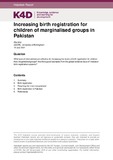| dc.contributor.author | Idris, Iffat | |
| dc.coverage.spatial | Pakistan | en |
| dc.date.accessioned | 2021-07-19T10:15:45Z | |
| dc.date.available | 2021-07-19T10:15:45Z | |
| dc.date.issued | 2021-07-16 | |
| dc.identifier.citation | Idris, I. (2021). Increasing birth registration for children from marginalized groups in Pakistan. K4D Helpdesk Report. Brighton, UK: Institute of Development Studies. DOI: 10.19088/K4D.2021.102 | en |
| dc.identifier.uri | https://opendocs.ids.ac.uk/opendocs/handle/20.500.12413/16747 | |
| dc.description.abstract | This review looks at approaches to promote birth registration among marginalised groups, in order to inform programming in Pakistan. It draws on a mixture of academic and grey literature, in particular reports by international development organizations. While there is extensive literature on rates of birth registration and the barriers to this, and consensus on approaches to promote registration, the review found less evidence of measures specifically aimed at marginalised groups. Gender issues are addressed to some extent, particularly in understanding barriers to registration, but the literature was largely disability-blind. The literature notes that birth registration is considered as a fundamental human right, allowing access to services such as healthcare and education; it is the basis for obtaining other identity documents, e.g. driving licenses and passports; it protects children, e.g. from child marriage; and it enables production of vital statistics to support government planning and resource allocation. Registration rates are generally lower than average for vulnerable children, e.g. from minority groups, migrants, refugees, children with disabilities. Discriminatory policies against minorities, restrictions on movement, lack of resources, and lack of trust in government are among the ‘additional’ barriers affecting the most marginalised. Women, especially unmarried women, also face greater challenges in getting births registered. General approaches to promoting birth registration include legal and policy reform, awareness-raising activities, capacity building of registration offices, integration of birth registration with health services/education/social safety nets, and the use of digital technology to increase efficiency and accessibility. | en |
| dc.description.sponsorship | FCDO (Foreign, Commonwealth and Development Office) | en |
| dc.language.iso | en | en |
| dc.publisher | Institute of Development Studies | en |
| dc.relation.ispartofseries | K4D Helpdesk Report;988 | |
| dc.rights.uri | https://www.nationalarchives.gov.uk/doc/open-government-licence/version/3/ | en |
| dc.subject | Children and Youth | en |
| dc.subject | Governance | en |
| dc.subject | Population | en |
| dc.subject | Rights | en |
| dc.title | Increasing Birth Registration for Children of Marginalised Groups in Pakistan | en |
| dc.type | Helpdesk | en |
| dc.rights.holder | © Crown copyright 2021 | en |
| dc.identifier.doi | 10.19088/K4D.2021.102 | |
| dcterms.dateAccepted | 2021-07-16 | |
| rioxxterms.funder | Default funder | en |
| rioxxterms.identifier.project | Default project | en |
| rioxxterms.version | VoR | en |
| rioxxterms.versionofrecord | 10.19088/K4D.2021.102 | en |
| rioxxterms.funder.project | 9ce4e4dc-26e9-4d78-96e9-15e4dcac0642 | en |

